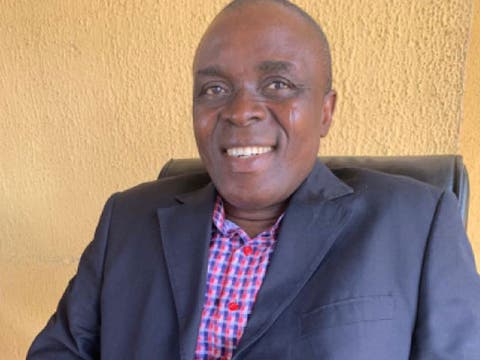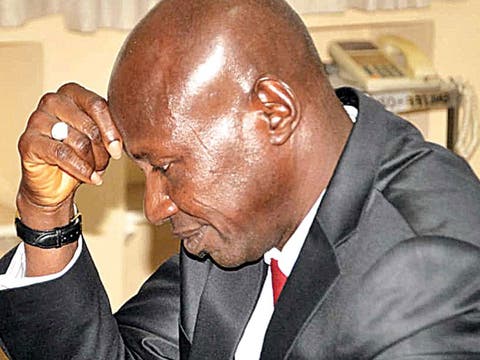Mr Ayo Olowonihi was a level 17 officer at the Economic and Financial Crimes Commission (EFCC) and Commandant (Director) of the commission’s academy in 2015 when Ibrahim Magu was appointed Acting Chairman of EFCC. After putting in almost 15 years in the service of the National Drug Law Enforcement Agency (NDLEA), he had elected to retire voluntarily, and later joined the EFCC.
Following the exit of Ibrahim Larmode, Olowonihi was one of those in the commission who were eminently qualified to replace him. He ostensibly lobbied for the top job. Magu, then Director of Operations under Lamorde, also lobbied for the job through the office of the National Security Adviser (NSA). As luck would have it, Magu was chosen to replace Larmode.
Little did Olowonihi know that his ambition to replace Lamorde did not go down well with Magu. For daring to nurse the ambition to become EFCC chairman, Olowonihi must be taught a lesson.

After trying unsuccessfully to get an operative of the commission to lie against him, checking through his records to try to find anything that could be used against him, and finding nothing, and after inquiring from his former employer, NDLEA, if he did any wrong that could be used to nail him and also finding nothing, Magu caused a phony query to be issued to Olowonihi.
In the query dated December 22, 2015, Olowonihi was accused of sponsoring negative publications against the EFCC in an online medium. He did not only deny the allegations but said he was the first person to draw the attention of Larmode to the publications since he was the chairman when the said reports were published. Olowonihi said his emails and bank accounts were investigated, but nothing incriminating or linking him to the publications was found. Yet, he was arrested, detained, and forced to make statements under caution. Not satisfied, Magu caused a suspension letter to be issued to him to enable the commission investigate the allegations against him, citing a defective EFCC Staff Regulations Handbook 2007.
The suspension letter was dated December 29, 2015. Since that day, the commission had stopped his salaries and he had been subjected to untold hardship. While the suspension lasted, entreaties were made to Magu to recall him, but Magu could not be bothered
Then two years after, on November 15, 2017, Magu caused a letter of reinstatement to be issued to him, but attached some onerous conditions. They included forfeiture of his salaries for the two years he was on suspension, writing a letter of apology to Magu, swearing to an oath of secrecy, downgrading to level 16 from level 17, writing an undertaking to be of good conduct, and deployment to work in Magu’s office.
The conditions were not only onerous, they were also humiliating. Olowonihi rejected them and issued a notice to commence a court action against the commission, an option he said he didn’t want to take in the interest of the commission.
In its judgement, the National Industrial Court of Nigeria (NICN) in Abuja reversed his demotion. Justice Musa Kado, who delivered the judgement, ordered Olowonihi to be reinstated as Detective Commandant, Grade Level 17, after he set aside a letter of reinstatement, which had downgraded him to Grade Level 16, for being illegal, null and void.
Olowonihi had asked the court to declare his demotion as well as the processes that led to it as illegal, unlawful, null and void. The claimant, in a 62-paragraph oath deposed in support of the suit, said he was not given fair hearing before disciplinary action was taken against him.
Among the issues raised for determination before the court were whether the EFCC Staff Regulations Handbook 2007 used for the discipline of the claimant was validly made, having not been approved by the commission.
Kado decided all three issues raised for determination in favour of the claimant. He held that the fact that the EFCC Regulation Handbook, which guides the appointment and disciplinary procedures of employees, had not been approved by the commission rendered it invalid. “Failure of the defendant’s counsel to produce approval by the commission means it is either not in existence or it will not be in the favour of the defendant,” he said.
Kado further noted that while the absence of signature on the document might not necessarily make it invalid, there was no commencement date to show when it actually came into force. He held that the approval of the draft by the chairman did not amount to approval by the commission, which had been empowered by law to do so.
The judge accordingly held that the purported regulation handbook used for the suspension and subsequent demotion was not valid and as such null and void.
The court having declared as invalid EFCC’s handbook for lacking approval of the commission, agreed with the submission of the counsel to the claimant, Professor Joash Amupitan (SAN), that the defendant did not comply with the Public Service Rules, the applicable regulation on disciplinary matters affecting the claimant, who was a Director on GL 17. He said section 9 (2b) of the Act establishing the EFCC provided that until there was a regulation in place guiding the appointment, discipline and dismissal of employees of the commission, the civil service rule shall continue to be in force.
Kado held that while the chairman of the commission or the secretary had the right to initiate disciplinary proceedings against the claimant, it was the commission that had the power to sanction after due consultation with the Federal Civil Service Commission.
Similarly, on the issue of fair hearing, the judge agreed with the claimant that the fact that he was not given the opportunity to defend himself before the ad hoc committee set up to investigate him and two others rendered the whole exercise a nullity.
“There is a violation of natural justice,” the court held, adding, “The claimant’s appointment is statutory and can only be tampered with strict public service rule.”
He subsequently held that the letter of reinstatement downgrading the claimant to GL 16 was “nullified and set aside” and ordered the EFCC to reinstate the defendant back to his position as Detective Commandant Grade Level 17.
Kado, however, stated that the court could not order the defendant to restore the claimant as Commandant of the EFCC Academy, as the defendant had the right to deploy its personnel to any position it deemed appropriate.
Curiously, the court refused to grant the prayers of the claimant on the payment of all his salaries and allowances within the period of the suspension on the grounds that the claimant failed to prove that he was entitled to such relief.
Born in Kabba, Kogi State, Olowonihi attended the University of Jos and Lagos State University, where he obtained B.Sc. Economics (Second Class Upper Division) and Masters in Public Administration (MPA), respectively. He obtained a Post Graduate Certificate in Corruption Studies from the University of Hong Kong, Certificate on Better Governance: Managing Corruption from the Singapore Civil Service College, Certificate in Mastering Competitive Strategy and Blue Ocean Strategy from the Lagos Business School. He is also a graduate of the Policy, Strategy and Leadership (Pre-SEC) Course of the prestigious National Institute for Policy and Strategic Studies, (NIPSS), Kuru, Jos.
Olowonihi joined the NDLEA at its inception in 1990 and attended the first Senior Officer’s Basic Course – ANS Course 1/90. He has attended numerous professional courses and management seminars in Nigeria, Germany, Côte D’Ivoire, Senegal, the United Kingdom, Mexico, Turkey, Hong Kong, Singapore, and Switzerland.
Olowonihi has acquired diverse experiences spanning 30 years in law enforcement, investigations, anti-corruption and good governance, personnel management, training and manpower development, etc.
While in the NDLEA, Olowonihi held appointments such as Acting Director, General and Assets Investigation, NDLEA Headquarters; Acting Director, Training Research and Development; Commandant, NDLEA Academy, Jos; Zonal Commander, Murtala Muhammed International Airport, Lagos; Director, Abuja Liaison Services; and Commander, Kogi State Command, among others.
In February 2001, Olowonihi returned to the agency’s academy as commandant. The high point of his second tenure was the upgrading of the academy to a regional academy for drug control in West Africa. After a successful second tenure, he served briefly at the agency’s headquarters as Coordinator of the National Drug Control Strategy.
He transferred his services to the EFCC in May 2005, and served as the pioneer Deputy Director/ Head of Training at the academy. He also served as Head of the Special Control Unit Against Money Laundering (SCUML).
